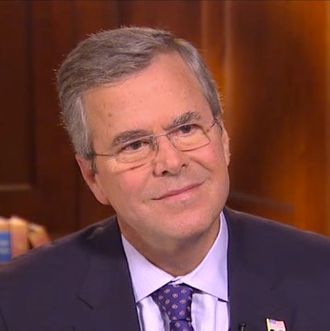
Jeb Bush is still the top 2016 GOP contender in national polls, but as others officially declare their candidacy, the former Florida governor is falling behind in some early primary states. Amid questions about whether he’s losing momentum, Bush has made the odd decision to embrace his biggest liability: former President George W. Bush. Recently the younger Bush offered a defense of the NSA’s domestic spying program and declared W. is his top adviser on U.S.-Israel policy, then in a Fox News interview teased on Sunday, he said that even with the benefit of hindsight, he would have authorized the 2003 invasion of Iraq.
The rest of Megyn Kelly’s sit-down with Bush — his first lengthy TV interview this year — aired Monday night, and in it he said he’s not stressing about his declining poll numbers. “The polls are totally irrelevant,” he said. “I’m not a candidate yet. So … everybody needs to take a chill pill on the polls until it gets closer.” Then he underscored that point by digging in on two other major issues that have angered conservatives: his support for Common Core education standards and immigration reform.
When Kelly noted that Common Core is tremendously unpopular with Republican parents, Bush offered a small concession. “Common Core means a lot of things to different people, so they could be right based on what’s in front of them,” he said. Then he went on to vigorously defend the program, saying people misunderstand what it actually means. “I respect people having a view, but the simple fact is, we need higher standards. They need to be state-driven. The federal government should play no role in this, either in the creation of standards, content, or curriculum.” When asked how he intends to win over the GOP base on the issue, he said, “I’m going to tell people what I think, which is high standards are better than low standards,” and pointed to the huge improvements Florida students made during his time as governor. (As the Washington Post explains, some Florida test scores did increase during his time as governor, but whether that’s due to the policies Bush cites is debatable.)
Next Bush made the case for immigration reform, saying he’s in favor of “allowing for a path to legalized status — not necessarily citizenship” for undocumented immigrants. He said he supports allowing undocumented immigrants to qualify for in-state tuition at universities, and would have (grudgingly) backed the immigration reform bill passed by the Senate in 2013 if that was the only way to begin overhauling the system. “You know there’s a core wing of the party for whom this will be a deal breaker,” Kelly said. “I don’t know that,” Bush countered. “I’ve been traveling over the last three months. I get a sense that a lot of people can be persuaded, to be honest with you.”
Then he made a subtle jab at Wisconsin governor Scott Walker, who recently said he no longer supports any form of “amnesty,” explaining “my view has changed.” “Do you want people to just bend with the wind, to mirror people’s sentiment whoever is in front of you? ‘Oh, yes, I used to be for that, but now I’m for this.’ Is that the way we want to elect presidents?” Bush said. Theoretically no, but voters may prefer a candidate who flip-flops over one who asks them to come around to his way of thinking.






























